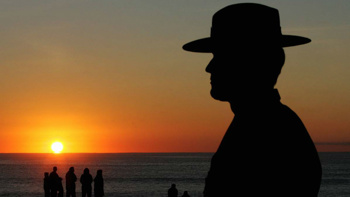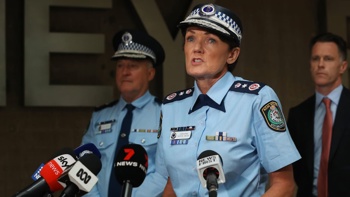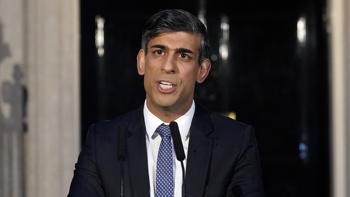OMICRON OUTBREAK LATEST
* Omicron surges in the capital: 22% positivity rate; outbreak in university halls
* Removal of self-isolation for vaxxed travellers 'sensible' - experts
* Two years of Covid in NZ - the wins, the losses and what comes next
* Employers brace for Kiwi worker exodus as borders reopen
* Minister tests positive for Covid; 14,633 new cases as NZ reaches grim milestone
There are nearly 20,000 new community cases of Covid-19 today, with 373 people in hospital, including nine in ICU, director general of health Dr Ashley Bloomfield said.
Speaking at a 1pm media briefing, Bloomfield also confirmed there are 99,859 active cases in the community, meaning 2 per cent of all New Zealanders are now considered to have Covid-19.
"Covid-19 is a very different foe to what it was in the beginning of the pandemic," Bloomfield said.
"For most people, Covid-19 will be a mild to moderate illness that can be managed quite safely at home."
A total of 19,566 new cases were confirmed on Tuesday - a new daily record - with Bloomfield conceding that PCR testing capacity was not keeping up with demand last week.
In Counties Manukau, 5.3 per cent of the population are active cases (30,801 of 578,650).
Pooling samples - testing one sample in a pool - was less feasible when the positivity rate was higher. Last Thursday, Bloomfield said, 17 of 20 DHBs recorded positivity rates of more than 5 per cent, which was unheard of a month ago.
The swift increase of the positivity rate meant that pooling of samples was no longer being done, he said.
Lab workers testing positive and limited supply of reagents also played a role in overestimating the testing network, he said.
Bloomfield apologised for the roughly 32,000 testing samples that had been delayed in processing for more than a week. These were mostly in Auckland but also in the Bay of Plenty.
"Our labs are committed to processing all those tests," Bloomfield said.
About 12,000 had been re-tested via PCR or RAT testing, he added. Some of the results, when they are returned, may be less sensitive than usual due to the delay.
The delays could have been minimised if the issues had been recognised sooner, he said. About 9000 tests were sent to Queensland over the weekend to help clear the backlog.
Using rapid antigen tests (RATs) has meant the pressure on testing capacity has been eased in recent days, Bloomfield said.
"We're addressing the situation."
Asked about overestimating the testing capacity, Bloomfield said being unable to pool samples meant the expected surge capacity of 70,000 results a day could not be met.
Unpooled capacity was meant to hit 59,000 tests a day by the end of March - though the demand has not reached that high yet.
The backlog had hit 50,000 at one point, he said.
He said he first realised the delay in the last week. Delays shouldn't happen anymore due to the use of RATs.
"It's not going to make a huge difference in our case numbers each day."
Anyone who had a PCR test on February 23 or earlier and are still waiting for a result should contact healthline for advice. All affected will be sent a test message today.
Where to find RATs
Bloomfield said over 5 million RATs had been distributed in the system, and there are 12 million held centrally.
"The challenge is distribution, with some of the logistics networks' staff being affected by the outbreak."
People getting RATs should also be given tests for their household members, he said.
RAT kits for use at home have been available at community testing centres, and can even be bought in retail outlets and be home-delivered, Bloomfield said.
"Anyone who needs RATs because they're a case or a household contact or are part of the critical worker scheme can access them for free through a range of places."
Hospital stays 'half the length of Delta'
Of the 373 cases in hospital, 4 are in Northland, 63 in North Shore, 134 in Middlemore, 115 in Auckland, 23 in Waikato 10 in Bay of Plenty, 3 in Rotorua, 2 in Tairawhiti, 1 in Hawke's Bay, 1 in Taranaki, 3 in MidCentral, 5 in Hutt Valley, 3 in Capital and Coast, 1 in Nelson Marlborough, 4 in Canterbury and 1 in Southern DHB.
The average age of current hospitalisations is 52, the Ministry of Health said in a statement.
According to Bloomfield, the average length of stay in Auckland hospitals is 2.2 days - half of the length of stay during the Delta outbreak: "People are mostly not needing respiratory support."
Hospitals around the country are at 80 per cent occupancy, while ICU units are at 57 per cent occupancy.
Most people with Omicron can be looked after at home, Bloomfield said, and 54 per cent of people notified by text that they are a case have followed up with a case investigation form online.
He asked people to continue to wear masks, socially distance, and to stay home if unwell.
"The next few weeks are going to be tough."
Asked about the breakdown of Delta and Omicron cases in hospital, Bloomfield said there was a lag in whole-genome sequencing of those in hospital - but the data was coming.
He said symptoms were similar - cough, scratchy throat, runny nose, body aches - regardless of whether people are boosted, but if they are boosted then their symptoms will generally not be as severe.
There have been "gastro-tummy" symptoms, particularly in children, Bloomfield said. Loss of smell or taste didn't seem to be a symptom of Omicron.
The hospitalisation rate - the number of cases in hospital and the number of active cases - was well under 1 per cent. Seventy to 80 per cent of cases in Middlemore Hospital had Covid symptoms and were treated at hospital for those symptoms, while the rest were in hospital for other reasons.
Bloomfield expected a "reasonably even" distribution of the Omicron sub-variants BA.1 and BA.2, and the vaccine was just as effective against both.
He said the 10-day isolation period for cases and household contacts was being looked at, and advice would be given to ministers soon. The period could drop to seven days.
Hospitals in Auckland were "really good" at infection prevention control, so most of the health workers who are infected were probably infected in the community, he said.
The proportion of cases in Auckland now will probably be replicated around the country in coming weeks, he said.
"It gives the rest of the country to learn from the Auckland experience."
It's possible that there will be a peak in Auckland and then in the rest of the country, he added.
"It will be very interesting to see where we settle. We're planning to expect a baseline level of infection going into winter."
The vaccination statuses of those in the Northern Region in hospital are 13.4 per cent unvaccinated or not eligible; 2.1 per cent partially immunised; 39.8 per cent fully vaccinated and 26.1 per cent not known.
Asked about health workers absent because of the outbreak, Bloomfield said that was something the system has been preparing for.
"We still want to try and keep that peak as low as possible."
He said Middlemore Hospital was down 15 to 20 per cent of staff due to the outbreak - either being cases or looking after others.
"They've got plans in place to move staff around ... the wind-back of planned care will be temporary while they need to focus on people who are acutely unwell."
Bloomfield said the ministry was looking at a number of issues once the Omicron peak has passed, including how useful a two-dose vaccine pass is, and the traffic light system in general.
Meanwhile, four Whānau HQ Care Hubs have been set up in Auckland to take pressure off the city's stretched emergency departments.
The hubs – two in South Auckland, one on the North Shore and one in West Auckland – are for people who have tested positive for Covid-19 and their isolating whānau and require urgent non-Covid-19 related care.
The centres will be staffed by GPs and nurses with experience dealing in urgent care. The service is free and can be accessed by appointment only between 8am and 8pm, seven days a week.
Protest calls 'irresponsible'
It was "irresponsible" for those in the occupation of Parliament - now into its fourth week - to tell people to shun public health advice, Bloomfield said.
"Masks are incredibly important. Please keep using them to protect yourself and others."
He asked Wellingtonians to stay away from the protest due to the risk of infection and called those in the occupation an "incredibly small minority" - given that 97 per cent of eligible people had had at least one dose.
A "number of people" unwilling to take Pfizer or AstraZeneca had been waiting for Novavax, which ministers have now approved for use, with first shipments expected later this month, Bloomfield said.
Less than 10,000 had taken up AstraZeneca so far, he said, and he described Novavax as a "good vaccine".
There remained good evidence to stay with a "largely" Pfizer-based vaccine programme, he added.
Halls of residence at universities were potentially super-spreader venues, Bloomfield added, though he was encouraged by the actions of educational institutes to try and prevent infections.
Daily press conferences back
Daily press conferences with health bosses and ministers returned today as Omicron case numbers continue to soar and the country sits in the worst phase of the outbreak exactly two years after the virus first wormed its way in.
With the exception of Monday's update to be given during the Prime Minister's usual 4pm post Cabinet press conference, the remaining briefings will be held at the familiar 1pm time.
Bloomfield will hold the briefings on Tuesdays and Thursdays, along with other health officials to provide health information. Covid-19 Response Minister Chris Hipkins will host on Wednesdays and different ministers will take turns on Friday, when it will be done from Auckland.
Yesterday the country recorded 14,633 new community cases of Covid-19 in New Zealand, bringing the total number of cases since the pandemic began to 100,000.
There were now so many new community cases everyday that the Government is now scrapping the requirement for Kiwis flying in from overseas to isolate at home for seven days.
For arrivals from Australia, they will be able to head straight into the community from 11.59pm on Wednesday. For arrivals from the rest of the world, it will start from 11.59pm on Friday.
The border will also now likely open up faster for non-Kiwis than what the Government has previously outlined, currently scheduled for July for those flying from Australia, and for October for the rest of the world.
Earlier today, the Government announced that the Novavax vaccine will be available for Kiwis aged 18 and over, with the first doses expected to arrive later this month.
In a late night social media post, Prime Minister Jacinda has recalled being called about New Zealand's first Covid-19 case two years ago, saying she knew it was the "beginning of a big battle".
Since receiving that call while speaking with the Prime Minister of Australia in 2020, Ardern said the world has fundamentally been changed by the pandemic.
"But in amongst all of the really tough times, I still hope the team of five million know that they made a difference."
Meanwhile a key health adviser to the Government is warning people to get ready for some difficult days in the next month as Covid cases continue to rise.
Strategic Covid-19 public health advisory group chairman professor Sir David Skegg said not only would an increase in cases continue to put pressure on the health system, but businesses would were being disrupted and people's social lives were also being impaired.
"There will be - there already is - considerable pressure on our health system so the next few weeks are going to be very challenging."
He told RNZ he was "not alarmed" by the current case numbers, but also didn't know when the outbreak would peak.
Speaking on only 70 per cent eligible people in New Zealand being boosted, Skegg said while he would like to see it up to 100 per cent he was reassured that it was much higher for older people who were the most vulnerable.
He urged people to get boosted now and said there was still time for people to do it because the majority of people still hadn't been infected.
There are growing concerns that protest scenes across the country pose a risk of becoming super spreader events.
Yesterday afternoon during a press conference, Prime Minister Jacinda Ardern said the protest was part of the outbreak, calling it "Covid camp" and advising that nobody go near it.
Some 17 people who entered the protest area have been infected with Covid but the actual numbers are expected to be much higher due to the reluctance of those involved to get tested.
There are concerns protests in Auckland and Christchurch could also be high-transmission locations.
Ardern said despite the Wellington protest entering its third week, Parliament had continued to operate safely.
Parliament was moving to hybrid settings but this was due to the outbreak, not the protest.
But one of the groups behind the protest has warned it will initiate mass non-compliance across the country from today if the Government did not end all vaccine mandates by 10am today.
"If the government is not lifting mandates today, we the people will lift them!" a post on the Freedom and Rights Coalition Facebook page said.
The group is threatening "united non-compliance" across the country, encouraging people to act as if Covid restrictions and mandates no longer exist.
People who lost their jobs due to vaccination orders are encouraged to return to work, as well as ignore other traffic light restrictions such as venue capacity limits, scanning in and the use of masks.
Take your Radio, Podcasts and Music with you









